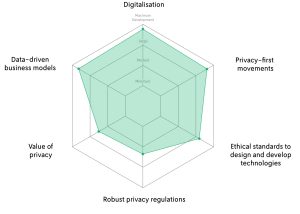Tech Giants Under Scrutiny: Navigating the Data Privacy Landscape
As concerns over data privacy escalate, major technology companies face a growing storm of scrutiny. High-profile incidents reveal questionable data handling practices, prompting regulators and consumers to demand greater transparency and accountability. This heightened awareness reshapes the digital privacy landscape, compelling tech giants to reevaluate their strategies in safeguarding user information.

Recent events underscore the urgency of addressing data privacy issues. In 2018, Facebook faced backlash after it shared personal data from 87 million users with Cambridge Analytica without consent. This scandal led to a $5 billion fine from the Federal Trade Commission (FTC) and severely damaged the company’s reputation. Following this incident, nearly half of surveyed adults reported severing ties with organizations due to data privacy concerns.
Similarly, Twitter has come under fire for its inadequate privacy practices. A class-action lawsuit filed in January 2023 accused the platform of exposing users’ personal information due to flaws in its application programming interface (API). Such incidents highlight a trend where tech companies increasingly fail to protect sensitive user data adequately.

The implications of these controversies extend beyond financial penalties. Companies that mishandle user data risk losing customer trust, leading to significant revenue losses. As consumers become more aware of their rights regarding personal information, they are more likely to support businesses prioritizing data protection. This shift in behavior forces tech giants to adopt robust privacy measures.
To navigate this evolving landscape, many companies look towards established regulations as a framework for best practices. The General Data Protection Regulation (GDPR) in Europe and the California Consumer Privacy Act (CCPA) serve as benchmarks for how organizations should manage user data. Compliance with these regulations helps mitigate legal risks and fosters consumer confidence by demonstrating a commitment to ethical data practices.

For instance, Google has faced criticism for its complex cookie consent processes that many users find confusing. Critics argue that these “dark patterns” manipulate users into accepting terms that compromise their privacy. In response, regulators have begun enforcing stricter guidelines requiring companies to present clear options for users regarding their data preferences.
Moreover, recent actions taken by Italy’s data protection authority against OpenAI’s ChatGPT underscore the global reach of data privacy regulations. Following accusations of illegal user data collection, OpenAI was forced to implement new privacy measures before resuming services in Italy. This incident illustrates how regulatory bodies worldwide are becoming more vigilant in holding tech companies accountable for their data practices.

The educational technology sector is not immune from scrutiny either. Companies like Tutor.com have faced increased examination regarding their handling of student data amid rising public concern over privacy in educational settings. Recent settlements involving organizations like the College Board highlight ongoing issues related to collecting and selling student information without proper consent.
As tech giants grapple with these challenges, they must prioritize clarity in their privacy policies. Many consumers do not read lengthy legal documents filled with jargon; therefore, companies need to present information about data collection and usage in an accessible manner. By simplifying privacy policies and providing clear opt-in and opt-out options, organizations can empower users to make informed decisions about their personal information.

The push for transparency is amplified by advocacy groups and lawmakers calling for comprehensive reforms in how tech companies handle personal data. These stakeholders argue that existing laws often fail to keep pace with rapid technological advancements, leaving consumers vulnerable to exploitation.
In conclusion, as technology evolves at an unprecedented pace, the demand for robust data privacy measures will intensify. Tech giants must recognize that prioritizing consumer trust through transparent practices is not merely a regulatory obligation but a strategic imperative. By adopting ethical data management strategies and complying with stringent regulations, these companies can safeguard their reputations while fostering long-term relationships with their users.

The road ahead will undoubtedly present challenges as regulators tighten their grip on tech companies’ operations. However, those willing to adapt and prioritize user privacy will likely emerge as leaders in an increasingly competitive digital landscape.

